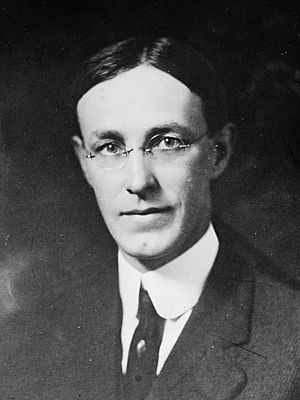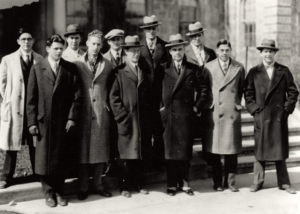Alexander Meiklejohn facts for kids
Quick facts for kids
Alexander Meiklejohn
|
|
|---|---|

Meiklejohn sometime before 1912
|
|
| Born | 3 February 1872 Rochdale, Lancashire, England
|
| Died | 17 December 1964 (aged 92) Berkeley, California, U.S.
|
| Alma mater | Brown University, Cornell University |
Alexander Meiklejohn (/ˈmiːkəlˌdʒɒn/; 3 February 1872 – 17 December 1964) was an important thinker, a leader at universities, and someone who worked to make education better. He is most famous for being the president of Amherst College. He was also a strong supporter of free speech, believing everyone should be able to share their ideas openly.
Contents
Early Life and Education
Alexander Meiklejohn was born on February 3, 1872, in Rochdale, England. He came from a Scottish family and was the youngest of eight sons. When he was eight years old, his family moved to the United States and settled in Rhode Island.
His family worked together to help him go to school. He earned two degrees, a bachelor's and a master's, from Brown University. He also completed his advanced degree, a doctorate in philosophy, at Cornell University in 1897.
A Career in Education
In 1897, Meiklejohn started teaching at Brown University. In 1901, he became the second dean of the university, a job he held for twelve years. Today, Brown University has an advising program for new students named after him.
From 1912 to 1923, Meiklejohn was the president of Amherst College. He tried to bring new ideas and reforms to the college. However, his time there ended when he had to resign because of these changes. Thirteen students even refused to accept their diplomas that year to show their support for him.
After leaving Amherst, Meiklejohn wanted to start a new, experimental college. He couldn't find enough money to create a brand new school. But he was invited by Glenn Frank, the new president of the University of Wisconsin, to create a special program there. This became the University of Wisconsin Experimental College, which ran from 1927 to 1932.
Meiklejohn retired from the University of Wisconsin in 1938. He had already moved to Berkeley, California. He also helped start the School of Social Studies in San Francisco. This was a program for adults that focused on important books and American democracy. Later, in 1965, this school became the Meiklejohn Civil Liberties Institute.
In 1945, Meiklejohn was chosen to represent the U.S. at the first meeting of UNESCO in London. UNESCO is an organization that promotes peace and understanding through education, science, and culture.
Later Life and Death
Alexander Meiklejohn passed away at the age of 92 on December 17, 1964, in Berkeley, California.
Why Free Speech Matters
Meiklejohn was very well known for supporting First Amendment freedoms. The First Amendment protects important rights like freedom of speech in the United States. He was also a member of the National Committee of the American Civil Liberties Union (ACLU), an organization that works to protect people's rights.
Meiklejohn strongly believed that freedom of speech was essential for a healthy democracy. He argued that in a democracy, the people govern themselves. For this to work, citizens need to be well-informed. This means there should be no limits on the free flow of information and ideas.
He believed that if those in power could control information or stop criticism, democracy would not truly work. Even if leaders thought they were helping society by controlling information, Meiklejohn argued that this goes against the very idea of democracy. Many experts agree that defending free speech for the sake of democracy is a very strong argument.
Awards and Recognition
The American Association of University Professors (AAUP) created the Alexander Meiklejohn Freedom Award to honor his important work.
In 1959, he received the Rosenberger Medal. Alexander Meiklejohn was also chosen by President John F. Kennedy to receive the Presidential Medal of Freedom. This is one of the highest honors a civilian can receive in the United States. It was given to him by President Lyndon B. Johnson shortly after Kennedy's death.
His Lasting Impact
Alexander Meiklejohn's ideas and work continue to influence many areas:
- Meiklejohn Civil Liberties Institute (MCLI) in Berkeley, California, continues his work on civil liberties.
- Meiklejohn Advising Program: This program at Brown University helps new students adjust to college life. Student advisors, called "Meiklejohns," are paired with first-year students to offer academic advice and support.
- Meiklejohn House: At the University of Wisconsin–Madison, Meiklejohn House is home to a program that encourages students to study different subjects together. This reflects Meiklejohn's ideas for an experimental college.
- Meiklejohn Hall: This building at California State University, East Bay houses many liberal arts programs, showing his influence on broad education.
- The Evergreen State College: This college in Olympia, Washington, was greatly influenced by Meiklejohn's teaching ideas when it was founded. It still uses many of his main principles today.
Books by Meiklejohn
Meiklejohn wrote several books about education and freedom:
- The Liberal College, 1920
- Freedom and the College, 1923
- The Experimental College, 1932
- What Does America Mean?, 1935
- Education Between Two Worlds, 1942
- Free Speech and Its Relation to Self-Government, 1948
- Political Freedom: the Constitutional Powers of the People, 1960
See Also
 In Spanish: Alexander Meiklejohn para niños
In Spanish: Alexander Meiklejohn para niños
- Meiklejohnian absolutism
- Meiklejohn Civil Liberties Institute (MCLI)
- John William Ward
 | Leon Lynch |
 | Milton P. Webster |
 | Ferdinand Smith |


